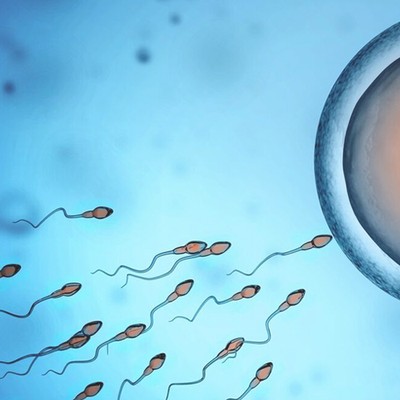
8 Ways To Make Your Man More Fertile
1. Maintaining A Healthy Weight
Did you know 24% of British males are obese? With this figure set to rise, health experts are warning this could seriously affect the nation’s fertility. “Being overweight can affect male fertility and reduce the quality and quantity of sperm count,” explains Dr. Marilyn Glenville, author of Getting Pregnant Faster.
This is likely due to a combination of factors, including hormonal problems, sexual dysfunction and other conditions linked to obesity such as type 2 diabetes and sleep apnea (both of which are associated with lowered testosterone levels and erectile problems). Studies have suggested carrying an extra ten kilos reduces male fertility by 10%.
2. Getting Enough Sleep
We’re always being told we need more sleep, but if you aren’t managing seven to eight hours’ shut-eye a night then your fertility may start to suffer. A study published by the Fertility and Sterility journal found men who slept for less than six hours a night were 31% less likely to impregnate their partner than men who were able to catch seven to eight hours’ sleep.
However, be wary of sleeping too long – the same study also found that over nine hours’ sleep could also reduce fertility.
3. Drinking Less Alcohol
Drinking up to the recommended limit of 14 units per week for men has not been shown to negatively affect fertility. However, drinking in excess of this (bear in mind one pint of beer has 2.6 units) can adversely affect sperm quantity and quality as well as contribute to a lower libido. The good news is, the negative effects of alcohol on fertility are quickly reversed when you stop drinking.
If you’re trying to get pregnant, it could be worth giving up the booze entirely. “The fact of the matter is that the more alcohol you drink, the longer it will take you to get pregnant and the less likely you are to be successful,” explains fertility expert Zita West. “Alcohol can deplete key nutrients like B vitamins and zinc, which are crucial for fertility; overburden the liver; and destabilise blood sugar, which can take its toll on sperm quality.”
4. Having More Sex
If you ejaculate very regularly (say, daily), the testes can’t keep up sperm production fast enough, so fewer sperm are present in the semen. However, it’s also not advisable to ‘store up’ sperm, as this can result in lower numbers of active, healthy sperm in the semen. Fertility experts say if you are trying to get pregnant, you should aim to have sex every other day.
5. Treating Erectile Dysfunction
The likes of erectile dysfunction may be a health concern your partner would rather ignore, but there are a number of natural ways to combat the common condition. “A really simple way to boost sperm count and quality is to consider taking an L-arginine supplement,” explains Marilyn Glenville. L-arginine is an amino acid, which is crucial for most metabolic processes – it contributes to the health of the vascular system by boosting blood circulation and regulating the relaxation of blood vessels
“As it supports blood flow, it is a natural remedy for erectile dysfunction, a common problem associated with infertility,” Glenville explains. “In addition, L-Arginine is essential for sperm production (it can be found in large amounts in the head of the sperm). You can find it in seafood, eggs, lentils, chocolate and whole wheat grains. You can also go for NHP’s Fertility Support, which contains 1000mg of L-Arginine.”
6. Taking Responsibility
While infertility is often seen as ‘the woman’s problem’, it takes two when it comes to fertility. “Falling pregnant isn’t straightforward and even a perfectly healthy sperm can have a difficult time meeting a perfectly healthy egg,” reveals AKEA Life Medical Director Dr Jaime Pawelek.
“Statistically, it takes most couples at least six months to get pregnant – the most important thing to do is visit your GP early on when you’re thinking about trying as they can offer personalised advice and optimise the treatment for any medical issues you may have.”
7. Keeping Cool
Heat is a significant problem for sperm. Male chefs, for example, have a high incidence of infertility since their testicles are exposed to a constant heat source. “Encourage your partner to keep cool by wearing loose-fitting boxer shorts and to avoid heated car seats, saunas and cycling,” says fertility expert Emma Cannon.
She also suggests men keep their phones firmly out of your pocket if they want to keep their sperm count high, as the increased temperature and electromagnetic activity could be damaging their fertility: one study found sperm levels of men who kept their phones in their pockets during the day were affected in 47% of cases.
8. Eating A Balanced Diet
As nutritionist Alix Woods explains, zinc, omega 3s and vitamin C are three nutrients crucial to sperm quality but also nutrients we’re commonly deficient in.
Researchers at the Harvard Chan Public Health School also found the regular consumption of processed meats can harm a man’s ability to fertilise an egg – however, these fertility problems were reversed when men switched to eating more poultry. In fact, the researchers found that men who ate the most poultry had 13% higher fertilisation rates than those who rarely ate it.
DISCLAIMER: We endeavour to always credit the correct original source of every image we use. If you think a credit may be incorrect, please contact us at info@sheerluxe.com.